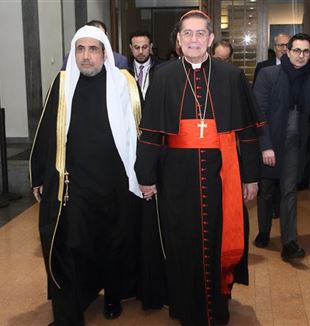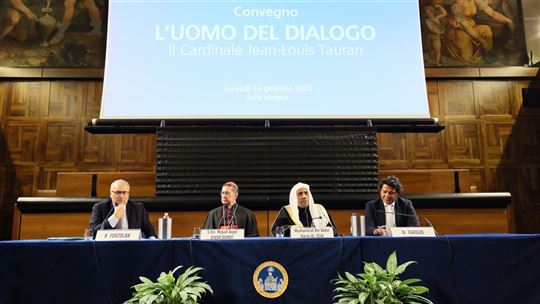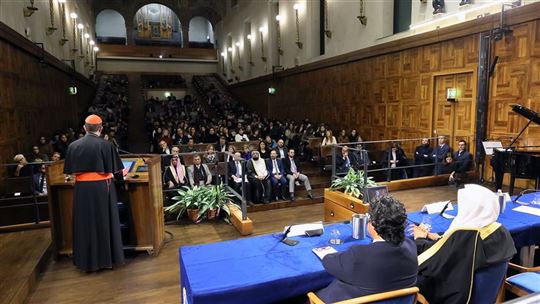
Tauran, the man who wanted to dialogue
A conference held in Milan to remember the Cardinal who visited Saudi Arabi in 2018 and laid the foundations for the Document on Human Fraternity, signed by the Pope in Abu Dhabi. Speeches by Al-Issa of the Muslim League and Cardinal Ayuso Guixot.A conference "in memory" often runs the risk of forcing its audience to look back; as if memory can be reduced to a re-visitation of the past that does not have much to say to the present, let alone the future. The tribute to Cardinal Jean-Louis Tauran, who died on July 5 2018, took place in the main hall of the Catholic University of Milan. For eleven years, Tauran acted as president of the Pontifical Council for Interreligious Dialogue and spearhead of Vatican diplomacy. The conference was a possibility to see the man once more in action, who had dedicated many years of his life in giving substance to a word that is much used and abused: “dialogue”. It offered the possibility to grasp the relevance and prophecy of his message. Tauran was a man who should not simply be remembered and honoured but is someone who still teaches; he does not belong to the past but, as described by Roberto Fontolan, journalist and director of Communion and Liberation’s international center in Rome, he “projects us into the future and launches the processes (as Pope Francis put it), pushing us to treasure his legacy and make it bear fruit”.
Rector Franco Anelli underlined the fact that the meeting was held in a Catholic university, a place which educates in knowledge and dialogue "which does not arise from the dilution of one's own peculiarities but from an authentic desire to know the other". Real dialogue, emphasized Wael Farouq, professor of Arabic Language and Literature at the University of Milan, "aims at a deeper understanding of oneself in relationship with the other, in a reality that is the outcome of the continuous encounter with God". He continued, speaking about another word that is used and abused: “identity”. He said, “[identity] is not something inherited from the past, but from the present, which acts to build the future. Identity is where the past and future meet".
Muhammad Bin Abdul Karim Al-Issa, secretary of the World Muslim League that represents non-governmental organizations from over 50 countries with an Islamic majority, came from Saudi Arabia to pay homage to Cardinal Tauran. He had met him in 2018 in Riyadh, the cradle of Islam, on the occasion of the historic guided tour that Tauran had long desired, and a year before in the Vatican with Pope Francis. He remembers him as "a wonderful model of dialogue and friendship, the most beautiful thing we can talk about", and as a person who testified that "accepting the differences present among men is the way to build an effective dialogue". "When God created mankind He made sure that each of us needed the other", and to make living memory of this is the most powerful antidote to hostility between peoples. Al-Issa's speech echoes some of the passages from the Document on Human Fraternity, signed by Pope Francis and the great Imam of Al-Azhar, Ahmad Al Tayeb, on 4 February 2019. The most prominent passage is dedicated to the urgent need for education to be offered to young people and the need to respond to their expectations, which are too often disappointed by proposals (even religious) that prove ineffective because they do not answer to their true questions, "they do not know how to speak to reason and spirit".
Tauran's intellectual, human and religious stature and his bold diplomatic qualities coupled with his curiosity for the other came alive in the words of his successor, Cardinal Miguel Àngel Ayuso Guixot, head of the Pontifical Council for Interreligious Dialogue. He too participated in Tauran's historic trip to Saudi Arabia and recalled that in his speech Tauran courageously addressed the crucial issue of citizenship, "saying that one is a fully-fledged citizen regardless of their religion and that one cannot use double standards because that would damage the image of people, communities, countries and religions". Avoiding any form of interreligious Irenicism, Tauran “was always convinced that good relations between Christians and Muslims could offer an irreplaceable contribution to peace in the world, arguing that the real threat was not the clash of civilizations, which he did not believe in, but the clash of ignorance and radicalism”. To those who condemn religions as being guilt of proposing absolute truths in an age that bows to relativism, Tauran replied that "religions are not the problem but part of the solution". He said that interreligious dialogue is not an option but a necessity. Tauran also recalled this in his speech at the 2015 Rimini Meeting: "We are called to share the riches of our cultures and to practice our religions respecting our specificities. An interreligious dialogue is needed to develop a culture that allows everyone to live in freedom with dignity and security".
For dialogue to be effective it must have three characteristics: identity, otherness and sincerity. Cardinal Ayuso quotes Tauran from the occasion of the fiftieth anniversary of Nostra Aetate, the Second Vatican Council document on the relationship between the Catholic Church and non-Christian religions: "In these times, dark and complicated for many reasons, I am convinced that the goal of dialogue between religions is to forge a common path towards the truth. This path must take into account the identity of those who dialogue: one cannot dialogue in ambiguity. It must also take into consideration attention towards the other: those who pray and think differently from me are not enemies. And it must consider the sincerity of reciprocal intentions".
READ ALSO - Brazil, a door that welcomes
Cardinal Ayuso concluded his speech by recalling the memory of Tauran that Pope Francis had recounted last October. It is a memory that gives us a clearer picture of the Tauran’s human profile. "In June 1993, in Vienna, during the United Nations Conference on Human Rights, he concluded his speech by recalling the need for dialogue. Upon leaving the forum, he happened to be confronted by a member of the Saudi Arabian delegation who asked how he could delve deeper into the importance of dialogue. His response was: "We can do it when I come to your country". That desire accompanied him throughout the years and was only fulfilled a few months before his return to the Father's house, with his visit to Riyadh in April 2018.” God had granted Tauran his wish: to meet Muslims in their own home.